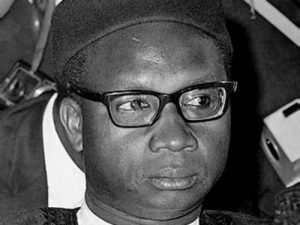By Kebba Ansu Manneh
 As the Constitutional Review Commission (CRC) embarks on consulting citizens on their recommendations for the Third Republican Constitution, Gambians are calling for a presidency with limited powers. They fear that without proper limits on presidential powers, presidents may use their office in ways that are self-serving, counterproductive to the public interest, or detrimental to the rights and freedoms of citizens, especially against those who may oppose their actions and policies.
As the Constitutional Review Commission (CRC) embarks on consulting citizens on their recommendations for the Third Republican Constitution, Gambians are calling for a presidency with limited powers. They fear that without proper limits on presidential powers, presidents may use their office in ways that are self-serving, counterproductive to the public interest, or detrimental to the rights and freedoms of citizens, especially against those who may oppose their actions and policies.
The CRC was tasked with the responsibilities of drafting a new constitution to be submitted to the president with an accompanying report on their work. It was created by an Act of the National Assembly enacted in December 2017. The 1997 Constitution under review created a near imperial presidency. Thanks to numerous loop holes and appropriations, the executive powers of the president are subjected to inadequate checks and balances from other institutions.

One such area is the power the president wields over elections. For example, the 1997 constitution vested the powers of appointing the chairman of the Independent Electoral Commission (IEC) and its seven commissioners in the hands of the president. This many see as a flaw that leads to unfair elections. As the national consultation for a new constitution comes to climax many Gambians are reechoing and contesting such powers to be entrusted in the hands of the head of state.
“For me I don’t think the president should be given the mandate to appoint the chairman of the Independent Electoral Commission and its commissioners. This powers should be given to the judicial service commission which I think is independent enough to handle such a responsibility,” said Councilor Ousman Bah of Giboro ward, Kombo East District, West Coast Region.
Arguing his points before the Vice Chairperson of the Constitutional Review Commission (CRC), Hawa Sisay-Sabally, Councilor Bah said if the powers of appointing the IEC Chairman and Commissioners is left in the hands of the president, then the impartiality of the commission will remain in doubt. He argued that such powers in the hands of the president could be subject to abuse especially in the events where the commission members failed to heed to dictates of the president.
Other areas having a chilling effect on democratic accountability were also mentioned by citizens. The president also has power to appoint the Governor, and Board of Governors of the Central Bank of The Gambia without any confirmation by the National Assembly. These powers gave a carte blanc to the former president Yahya Jammeh to clandestinely withdraw millions of dalasis from state coffers during his twenty-two years of authoritarian rule in The Gambia.

“For me what I want to see in the new constitution is for the president to stop appointing people to our important and trustworthy offices because if the president continues to appoint such people, he will continue to sack them at his will, especially if they don’t dance to his tunes,” said one Ebou Jagne who appeared to be an octogenarian.
Jagne said it will be very dangerous to leave the powers of appointing the Governor of Central Bank and its board members with the president, observing that if Gambians did not learn from the lessons of the former president they will never learn. “The embezzlement of millions of dalasis by Yahya Jammeh through the aid of the former Governors of the Central Bank is a clear testimony that this power of appointing the Central Bank Governors, and its Board of Governors cannot be entrusted in the hands of the president,” he said. Jagne is a passionate Gambian who, among many others, is yearning for a new constitution that will save and protect the interest of the future generations.
One among many youths in the country who challenged other powers entrusted to the president by the 1997 constitution is Ebou Taal of Faji Kunda Bajonkoto . He argued that the president should not have the powers to appoint the Auditor General, adding that such powers should be vested in the Judicial Service Commission through the National Assembly.
Taal told commissioners that if the powers of appointing the Auditor General is vested in the president, he may abuse his powers if the Auditor General refuses to follow his orders. He argued that the position of the Auditor General should be very independent from the hands of the executives.
Sulayman Jammeh is the Councilor for Bundung Six Junction who joined his compatriots in calling for less powers vested in the hands of the president. He proposed that the president should not be one responsible to appointing heads of parastatals, Chiefs and Alkalolu. He contended that if the president is given such powers he may abuse them to his own end especially if such heads of parastatals, Chiefs and Alkalolu refused to comply with his orders.
“What I would like to see in the new constitution is to take the powers of appointing the heads of parastatals from the president because such powers can be used in the retroactive ways to victimize such heads. These powers I would like it to be vested in the hands of an independent body with the approval of the National Assembly,” Councilor Jammeh submitted his takes on the appointment of the Auditor General before Vice Chair Hawa Sisay Sabally of the CRC.

He said the new constitution should also take the appointment of Chiefs and Alkalolu from the president, which he said should follow the old rules of filling such offices through the customary system of inheritance.
“I think the powers of appointing Chiefs and Alkalolu should not be with the president, I believe we (Gambians) should leave that in our traditional way. If this powers are left with the president it will create troubles in our villages and communities. I want to say that we leave the appointment of Chiefs and Alkalolus in our traditional ways of inheritance because if you deny the founding fathers of the villages with what they own you will bring troubles in our communities,” the Bundung Six Junction Councilor adduced before the commissioners.
The calls for limited powers to the president on appointment of key government officials intensifies from a cross sections of Gambians. Some of the deficiencies of the 1997 Constitution, according to constitutional experts were the results of series of amendments undertaken by the former government. These experts say the 1997 constitution has been amended by ex-president Yahya Jammeh’s fifty (50) times in his bids to extending his rule of the country. However, many of such powers are still in the constitution that is currently under review among which are the powers of appointing the vice president, speaker of the National Assembly, governors of five administrative regions of the country among others.
The Times talked to Foday Samateh on the recommendations and solutions proposed by citizens who testified to the CRC. Samateh has written numerous articles on presidential powers including publishing, on this medium, his responses to the “Issue Document” circulated by the CRC for citizens to respond to the questionnaire.
Even though Samateh agreed with recommendations to reduce and set limits on the powers of the president, he maintained that the president should retain the power to make appointments to non-elective offices on the condition that all such appointments should be subject to the National Assembly confirmation. To entrust unelected bodies with the power to make such crucial appointments, he cautioned, would never be the answer. The President should make the nominations to ranking positions in the executive and judicial branches, and the National Assembly should weigh in on the nominations through a rigorous confirmation process. As for the Governors of the administrative regions of the country, he argued that they should be elected by the people. And the case of Alkalolu should be a matter for the local governments, not the president. Samateh’s objections to the judicial commission making these appointments are that the Judicial Service Commission itself is largely appointed by the president, and that it’s a sub-body under the judicial branch.

